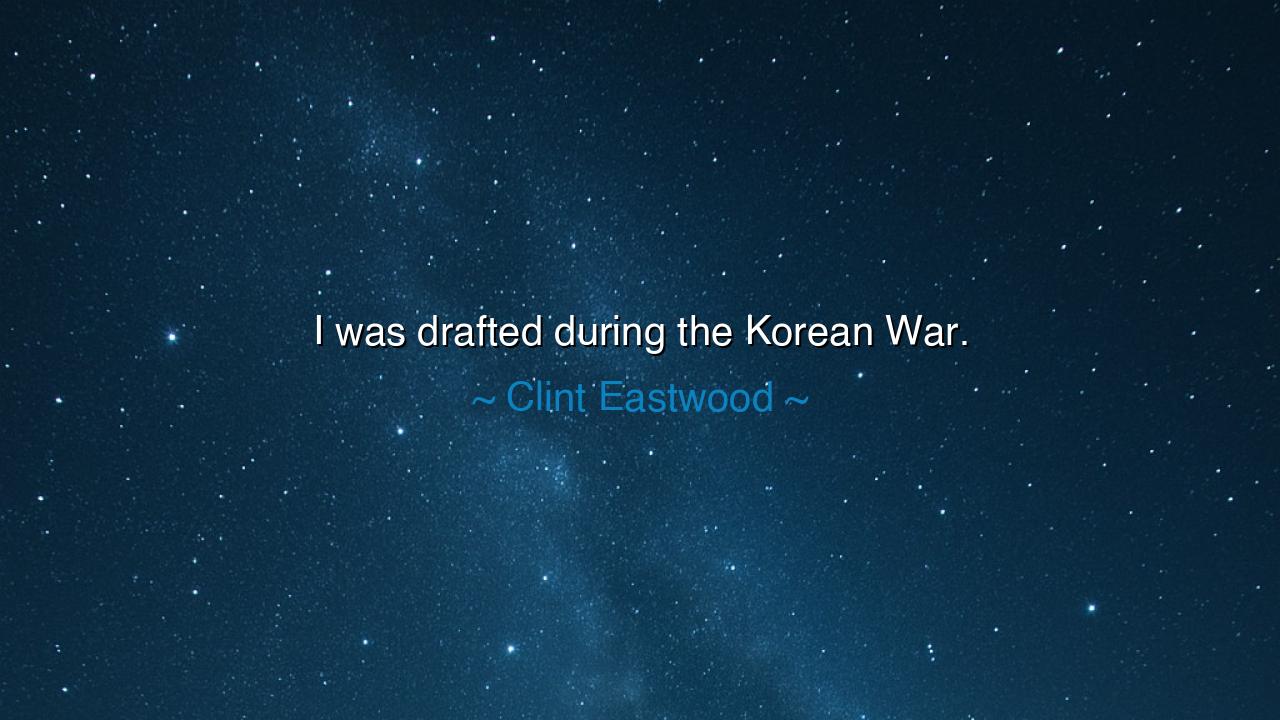
I was drafted during the Korean War.






Hear the simple yet weighty words of Clint Eastwood, who once declared: “I was drafted during the Korean War.” At first, these words seem but a plain remembrance, a statement of fact. Yet within them lies the echo of an age, when countless young men were summoned by duty, not by choice, and thrust into the shadow of conflict. Eastwood’s reflection is not just about himself, but about a generation shaped by the burden of obligation, when the hand of the state reached into homes and carried away sons to serve.
The origin of this statement rests in the dark years of the Korean War (1950–1953), a brutal struggle often remembered as the “forgotten war.” It came so soon after World War II that many nations were weary of battle, yet once again, young men were called forth to fight in a land they had never seen. Eastwood was among those drafted—pulled from the course of ordinary life and made to wear the uniform of his country. Though he did not see combat overseas, his life was altered by the reality of being chosen, his fate no longer his own.
The meaning of his words is both personal and universal. To be drafted is to surrender choice. It is to have destiny reshaped by forces larger than oneself. It reminds us that war does not only involve those who volunteer or seek glory, but also the reluctant, the unprepared, the ordinary men whose greatest act of courage was simply to answer when called. In this truth, Eastwood’s statement becomes more than memory—it becomes testimony to the burden of generations who were taken from home, work, and family to serve in wars not of their making.
Consider the story of Desmond Doss, though from an earlier conflict, World War II. Drafted despite his pacifist beliefs, he refused to carry a weapon but chose to serve as a medic. On the island of Okinawa, he rescued dozens of wounded men under fire, carrying them to safety one by one. His story shows that being drafted does not dictate one’s heart—it only places one in the crucible. Each must choose how to serve, whether with a rifle, with healing hands, or with steadfast courage. Eastwood’s words remind us of this same truth: the draft does not only conscript bodies, but tests souls.
The lesson is that life often places us in roles we did not choose. We may be drafted into hardship, loss, or responsibility we never sought. Yet how we respond—whether with bitterness or with resolve—becomes the true measure of who we are. Eastwood’s quiet acknowledgment of his draft is also an acknowledgment of acceptance, of moving forward with what was required of him. And so must we learn to endure the summons life places upon us.
What, then, must we do? We must honor those who answered the call, whether they sought it or not. We must remember the millions of young men and women who gave years of their lives in service, often unwillingly, yet with dignity. And in our own lives, we must be prepared to face duties not chosen, to stand firm when circumstance drafts us into struggle. For the spirit of resilience is forged not only by what we desire, but by what we must endure.
Therefore, let the words of Eastwood stand as a teaching: to be drafted during the Korean War was not only to serve a nation, but to embody the truth that life often chooses the field, and we must choose the courage. Let us carry this wisdom forward: when summoned by duty, by hardship, or by destiny itself, let us answer not with fear, but with strength. For though the call may not be of our making, the response is always ours to shape.






NVVo Dinh Nhat Vu
It’s easy to overlook how life-altering a single sentence like this represents. Being drafted meant leaving everything behind—dreams, safety, and control. I wonder if Eastwood’s later preference for strong, self-reliant characters was his way of reclaiming autonomy after a time when he had none. Maybe his films are, in part, an ongoing reflection on that loss of freedom.
LTLe Thi Le Thuy
This quote brings up an interesting question about fate and identity. How many of the people drafted during that era came out fundamentally changed? For Eastwood, it might have instilled a sense of realism that later defined his filmmaking style—his focus on moral ambiguity and the cost of violence. Was his fascination with war and justice rooted in those early experiences?
UGUser Google
There’s something understated yet powerful about this statement. It’s not dramatic or self-pitying—just factual. That simplicity makes me wonder how Eastwood processed the experience emotionally. Was it a turning point that hardened him or humbled him? Considering his later roles as stoic heroes, maybe that exposure to real-world discipline and danger influenced his on-screen persona.
DPDu Pham
This line makes me think about how generational experiences shape public figures. For Eastwood’s generation, being drafted was almost a rite of passage, whether they wanted it or not. I wonder how such an experience would compare to today, when military service is voluntary. Would younger generations even understand the sense of inevitability that came with a draft?
DADiep Anh
It’s strange to think of Clint Eastwood, the ultimate symbol of rugged independence, being drafted. That experience must have been a profound test of his character. I’m curious whether he felt resentment toward the system that drafted him, or if it taught him discipline and perspective. Did it make him more skeptical of war, or more respectful of those who serve?